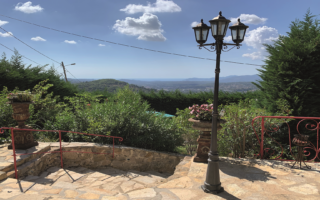Designs for old age
Growing old or infirm in France needn’t spell the end of your expat dream. With careful preparation, Life can go on, as Mary Hall explains
When you’re young and as fit as a fiddle, it can be hard to imagine yourself handicapped in any way, but with age comes the increasing risk of strokes, arthritis and other debilitating conditions. You may not need a wheelchair, but getting around won’t be so easy, and it pays to think ahead. Obviously it’s easier to build in frailty friendly’ features at the start of a project than it is to make modifications later, but often one has to make do. You don’t always get advance warning of illness in the family.
Safety first
Indoors, go for simple clean lines without unnecessary clutter. Rugs, umbrella stands, fragile furniture and fussy ornaments at hand height all need to go. When you’re unsteady, you tend to put out your hand for security, so what you get hold of needs to be solid; and if your sight is going you don’t want to be worrying about bumping into things. If you’ve had kids, think toddler’ and what you moved out of the way: it’s a similar game plan. Simple changes can make your house safer, and an easier place in which to live.
Ground-floor accommodation with kitchen, bathroom, bedroom and living space is clearly ideal. You may have to make sacrifices to achieve it, but if doing so means you don’t have to move house it’s often the preferred option, although don’t expect to get any grant aid in France to help you do it. When rearranging, think of the telephone and power sockets you’ll need when furniture is in different places. You won’t want trailing extension leads for your TVs, internet access and reading lights.
Small but important things to plan for include enough storage space for clothes and bed linen. If you cannot get a bathroom downstairs, at least fit in a WC so you can minimise the need to negotiate stairs.
Special equipment
Having a bathroom you can safely use in comfort and with the minimum of assistance is vital for health and dignity. The ideal is a large well-equipped wet room with a shower. If this isn’t feasible, choose a large shower cabinet, (forget the bath), handbasin, WC, storage and allow space for a chair. Think about someone moving in the space with a walking frame: is it possible? Fit handrails wherever you might need them, you can also get floor-to-ceiling support poles (a vision of pole-dancing grannies has just crossed your mind, I see!), and make sure towel rails and other accessories are solidly fixed to the walls. Taps should be lever-operated: elderly or arthritic hands can’t cope with turning knobs.
When you can’t bend to floor level, or reach up to top cupboards, you need to reorganise your kitchen. That trendy Belfast sink is not such a good idea; your back will ache bending over it. Filling the dishwasher becomes a mammoth task. Think hard about what you really need to use, and be realistic about the amount of entertaining you are going to be doing.
How many flan dishes do you really need, and are you ever going to use that raclette set again? Be brutal. When the family visits, they can take you out to lunch. A perching stool where you can rest as you work is a simple but brilliant idea. Websites such as www.essentialaids.com and www.focusondisability.org.uk/disabled-product-index.html are full of all sorts of useful gadgets for the kitchen and around the home, often things you wouldn’t have thought of but that can make independent living so much easier.
Efficient heating
When you are not so mobile and are sitting for longer periods, you feel the colds and draughts. You need cosy living space. Efficient and easy-to-
use heating becomes very important, as does the cost of it with increasing use. Log-burners are wonderful and cheery, but at least one person in the household needs to be fit enough to load the wood and clean the grate, and be available all day.
You may need to combine several forms of heating. Don’t eliminate the woodburner, and keep some logs handy: anybody who has lived in rural France for long will have suffered power cuts, sometimes lasting for several days, after storms. You will bless the woodburner then!
Accept that you need help in the house: find a cleaner or carer by word of mouth (pay by the cheque d’emploi service to be legal and to benefit from credit d’imp�ts) or ask your mairie for information on associations such as l’Association du Service � Domicile (ADMR), www.admr.org.
Outside, you will need reliable proximity lighting covering the key areas and paths, including access to your car, outbuildings and any area you may need to get to in the dark. Paths need to be wide enough to allow two people to walk side by side (you and someone holding your arm).
All outside surfaces should be non-slip (antid�rapant is the adjective you need if you’re choosing slabs or tiles). Changes of level should be particularly well lit, and have a solid handrail on at least one side. If you can afford it, fit automatic gates and garage doors.
Garden chores
Green-fingered folk rue the day when they can no longer work for hours in the garden. It’s hard to change the gardening habits of a lifetime, but unless you can afford to pay a regular gardener you will eventually need to prune back your tended area and accept the fact that bringing on all your summer bedding and tomato plants from seed might be too much. Concentrate on areas you can see from the windows and plant up pots on your terrace. The far corners of your lawns can become a wildflower garden and a haven for wildlife.
Some people find it hard to face up to the reality of a less active life, which is a pity as, with a little care, patience and organisation, you can create a safe, happy and comfortable environment in your own home. Facing up to reality and with proper planning, as the photo shows, it is possible to grow old and enjoy life in France!
Share to: Facebook Twitter LinkedIn Email


